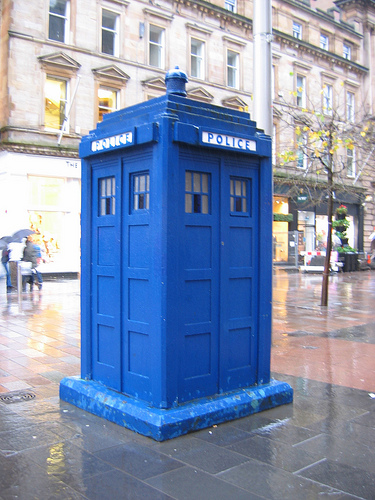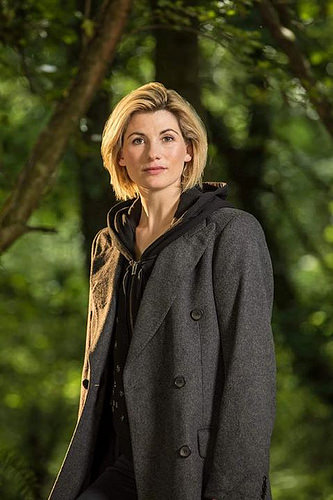
In a move that was not so much foreshadowed in the just completed season of Doctor Who as dragged across the sky in a very large banner, the soon-to-regenerate Doctor is to become a woman.
Announced in the wee small hours of Monday morning Australian time, actress Jodie Whittaker will be taking over the iconic blue box as the BBC finally give up all pretence of being rational, and throw themselves willingly at the feet of the easily-triggered left.
Wow.
Shark.
Jumped.
Way to kill a long-running and well-loved programme.
‘But wait!’ cries the loyal and pragmatic band of XYZ readers, ‘You haven’t even seen her act yet. Are you sure you aren’t just being sexist?’
Addressing the last point first, duh! pay attention, while for the first problem we must look at the structure of storytelling.
The standard arrangement for Doctor Who has been to have the Doctor, who plays the part of the Hero, and the Companion, who plays the Audience Surrogate.
This role is very important. The Hero can be as brave and enigmatic as they need to be, saving the day with a mixture of cleverness, planning and deus-ex-machina-style lazy writing. The Audience Surrogate, in comparison has the role of not only asking all the dumb questions so that the hero can sprout the exposition (”Where are we, Doctor?”) but also provides the voice for the audience playing at home in asking all those blatantly obvious questions (”Why can’t we just leave?”).
Audience Surrogates are not just a Doctor Who construct but a staple of storytelling within cinema and television. Written form has a greater freedom of structure, as does the visual form of comics. For cinema and television, you either go down the film noir path of a voice-over, or place in a character to ask all these questions.
This role doesn’t have to be the sole function of this character. Ripley in Alien was Audience Surrogate, tasked with asking the rational questions on behalf of the audience about simply gathering all the survivors and doing a bunk in the shuttle, before stepping up into the Last Character Standing Hero/Survivor role. In Aliens the task fell to the late Bill Paxton with Private Hudson. True, his arc also travelled from arrogant dick to heroic badarse via snivelling coward, but asks all the big questions. His legendary ‘Game Over Man, Game Over!’ rant after the dropship crash also literally contains the ‘What are we gonna do?’ line, because even when surrounded by burning wreckage, someone has to move the plot along.
So, back to our blue box, the role of the Companion and its vital importance to the overall dynamic of the show. If you talk to anyone who grew up with the programme, you will often hear the forlorn yearning that they wished the Doctor would come and take them off on adventures. Now if we hold that thought for a paragraph or two, let us sidetrack and look at the usual casting of the Companion as a youthful female.
There are exceptions, of course. Original Doctor William Hartnell was given William Russell’s character of Ian Chesterton, partly to allow for the fact that Hartnell wasn’t about to be engaging in too much physical action. The similar theory was brought in for Ian Marter’s Harry Sullivan when Tom Baker entered the show. Original casting before Baker was finalised was leaning towards another ‘older’ Doctor, and the character of Sullivan was intended to handle the action. With Tom Baker playing the Doctor the role was largely redundant, and Sullivan, apart for a few returns during Earth adventures, was never seen again.
Also we must mention the Patrick Troughton and Frazer Hines buddy movie dynamic with the Second Doctor and Jamie, but also remember that during this minor period of bloke-based time travel there was also a youthful female there to complete the dynamic.


So, the normal format for TARDIS crew has been male Doctor and female Companion, because as something that reaches out to the viewing audience, it works. Let us return to the longing felt by viewers to join the Doctor on an adventure and consider it in greater detail. Remember that these people wish to travel WITH the Doctor, not become him. The Doctor has always been deliberately shown as a mysterious character. Proof is in the show’s name after all; it’s never been a secret. So we have the viewing fans wanting to travel with this mysterious man. Not become this mysterious man, but travel with him. And to talk about the elephant, when we are saying fans, we are talking about the females.
Why? He is mysterious. He’s a man. Men are different. If they wanted to travel with another woman they could book a weekend flight with their BFF. Instead, here we have an interesting male figure who is usually always polite, and wants to talk to them rather than perv at their breasts and to reinforce outdated gender stereotypes pushed by the misogynist patriarchy; why wouldn’t the female fans find him interesting?
As for male viewers, well, probably less so. Your author here confesses to spending a lot of youth watching Doctor Who from the kitchen because, well, scary stuff, but I cannot personally recall ever having any desire to become a Companion. It is however worth mentioning that Doctor Who has always had a steady gay following over the decades within fandom.
Draw your own conclusions.
The Doctor, especially during the era of NuWho, has gained a large percentage of the ‘Squee’ (http://www.urbandictionary.com/define.php?term=Squee) demographic. The relationship between the Doctor and Rose was openly approved as the Official Ship, to the extent that the show runners ensured that Rose received her very own Clone Doctor for her personal shits and giggles, after she was written into a parallel dimension. The power of Squee, after all, is not to be mocked.
So we have defined the established format. Male Doctor. Female Companion. A hint of mystery and a hint of romance.
Now why would changing this gender dynamic be so terrible? Why can’t the show have a female Time Lord and a youthful male Companion?
Well, let’s consider. The Doctor has always been largely two things.
Firstly, mysterious and slightly eccentric, but also deeply protective and willing when required to stand up and deliver a massive authoritative smack-down on the universe’s bullies and tyrants. Then destroying their planet. Might equals Right when you carry the sonic.
So, eccentric female? Quirky is only cute for so long, and the line between quirky and full-on Frightbat can be as thin as a single Twitter post. As for authoritative? Most people already have an authoritative woman in their lives. They are called Mother. As much as people love their mothers, they very rarely want to road trip with them.
Now at this stage you might be saying that this is only the outdated misogynist patriarchy speaking, but there is another demographic that don’t want strong female characters to get ideas too far above their station, and they are called women.
The excuse normally given for the lack of truly powerful female actors is that men hold them back, but the unspoken truth is that woman don’t want them. If a man sees a strong male he sees an Alpha. Men are pack creatures at heart and work best together once a hierarchy has been established. When exposed to a strong female they either see her as someone they can work alongside, someone they are hoping to work under, with a whip, or get frustrated due to their own uncertainty about their position in life. Men have issues, some of them are rather sexist, we accept that.
The counterpoint is, show a man a submissive character who is not the Alpha and he had better be cool to have around or pack rules are going to place him down the bottom with the food scraps. You want to run with the pack, you need to fit into the pack dynamic, and the best way to achieve that is to grow a pair.


Place a strong female in front of a woman and the rival gene kicks in. Your author recalls a conversation back in the time of the original Hunger Games movie, where the question was raised about the suitability of the then rather unknown Jennifer Lawrence for the lead role. The female contribution within that social group to the discussion was a very vocal insistence that her breasts were too big.
Women are also the demographic that expects some form of romance. Men largely want to see something blow up and maybe a flash of nipple, but women desire romance. Even the nominal bastions of ‘Strong Females’ within television are filled with female leads who end up seeking emotional strength in the arms of a big hunky man. Take Buffy and/or anything else written by Josh Whedon and count the amount of times the ‘strong’ female ended up requiring a man to function.
This isn’t the misogynist patriarchy speaking – it’s the way world works.
Slash Fiction, the genre of fanfiction which takes existing characters and pairs them ‘correctly,’ is massively female-dominated. Men will accept a female provided they fit to the pack rules of hierarchy. Women will not accept rivals.
The BBC has decided to submit to the Cultural Elites and show how progressive they are by re-inventing the show and finally casting a woman to play the Doctor. They now just have to hope that these same Elites are going to be the ones driving the viewing figures and buying the merchandise, because when you re-invent a show you also re-invent the fan base.
As a longtime fan, this author must express some sadness at this final and overt Shark Jumping of something that had been followed for decades, but on the other hand, Atomic Blonde comes out next month and that looks awesome.
Photo by Daniel Rehn 










